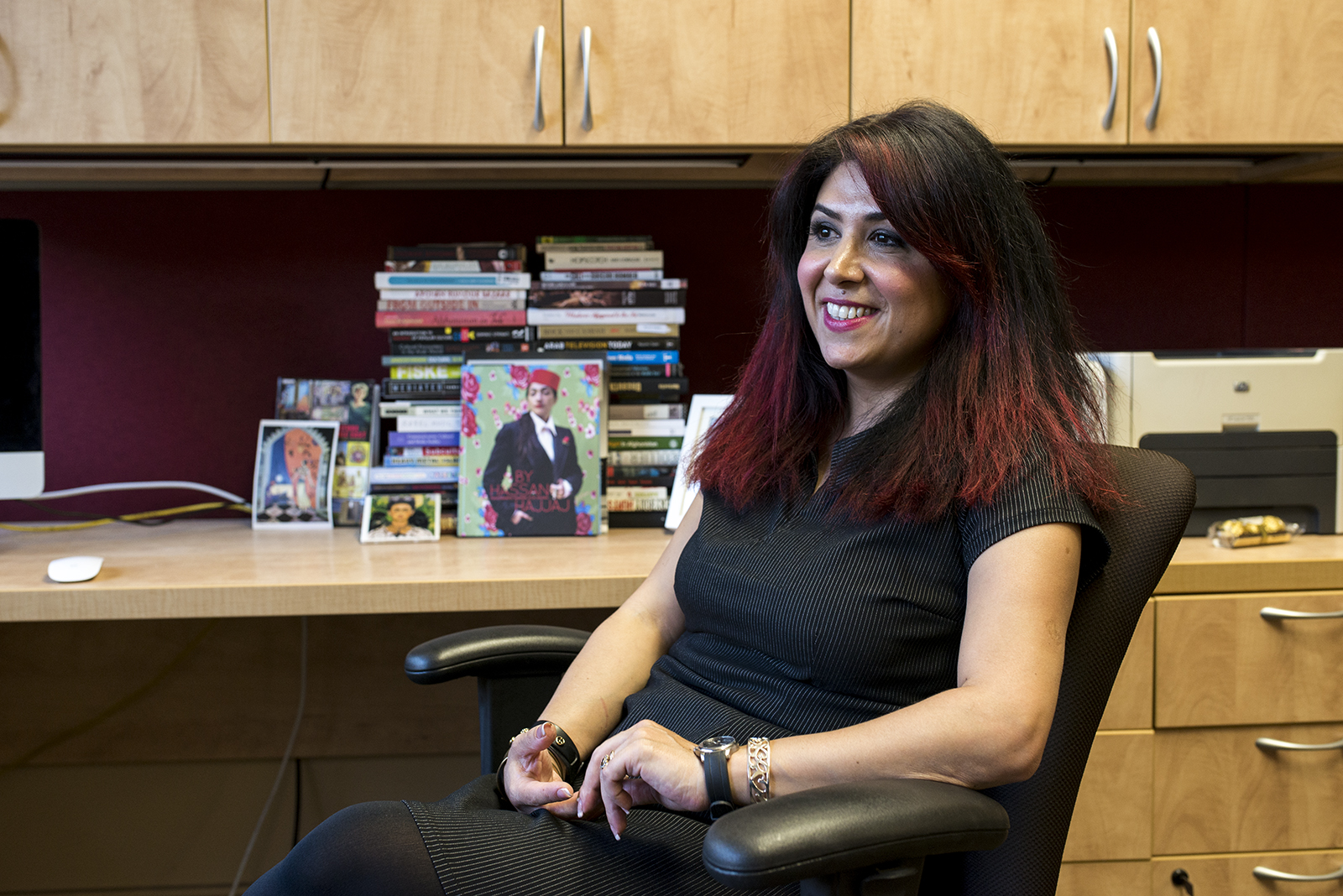Lecturer’s educational enthusiasm stems from upbringing in war zone

Nushin Arbabzadah, a communication studies lecturer, worked for three years at BBC Monitoring before beginning her career at the university. (Angie Wang/Daily Bruin senior staff)
By Daily Bruin Staff
Feb. 26, 2015 2:06 a.m.
Nushin Arbabzadah didn’t know she was looking at dead bodies the first time she saw them.
She and her 7-year-old classmates lined up in front of the classroom and stared as men carried teenage girls on stretchers to the hospital next door. She thought the girls were sleeping, until one of her classmates started to cry.
Arbabzadah, now a communication studies lecturer at UCLA, grew up in the war zone of Soviet-occupied Kabul, Afghanistan, and attended the first all-girls school in the country. The Soviet Union established a pro-Soviet regime in 1979 and occupied the area for nine years, according to The Atlantic. The conflict claimed approximately one million lives.
That day, rebels known as the mujahideen poisoned a school well after expressing hostility toward the syllabus. They threatened the school regularly because of Soviet propaganda in the curriculum.
At least 10 teenage girls died that day. Arbabzadah said there was no documentation of their deaths because the government didn’t allow independent media coverage of the attacks.
Arbabzadah now teaches students about how press coverage in the Middle East and Europe can reflect nations’ internal debates. This is her third year at the university.
Before teaching at UCLA, Arbabzadah worked for three years on the Afghan news desk at BBC Monitoring, which reports on media around the world. She analyzed the coverage of the Sept. 11 attacks and U.S. military involvement in Afghanistan.
She studied the linguistics and literature of Germanic and Spanish languages at the University of Hamburg in Germany, and graduated with a secondary master’s degree from the University of Cambridge in 2002.
Arbabzadah returned to Afghanistan as a reporter in 2011 to meet with then-President Hamid Karzai to talk about Arbabzadah’s work. During her trip, she visited her elementary school and said she noticed the schoolgirls behaved like adults rather than the playful children she remembered from her days as a student. She said she thinks the change reflects the growing influence of the mujahideen, who had overthrown the Taliban in 2001 with the help of the U.S. forces.
“I really saw the impact of decades of oppression,” Arbabzadah said. “These girls were so quiet, it was eerie.”
Political unrest directly impacted Arbabzadah’s early education. Students evacuated several times in response to bomb threats, but she said the risk didn’t stop them from returning to school the next day.
“Education is intimately linked to power,” Arbabzadah said. “What you think is something people fight over.”
When the regime change began in Afghanistan, the communist regime was comprised of Afghans allied with Soviets. Arbabzadah’s family experienced the gravity of its threats. Her uncle was captured when Arbabzadah was a young child, but the government denied any involvement in his disappearance. She said she suspects her family was targeted because they belonged to the business class.
Two men from the regime’s secret service asked Arbabzadah’s uncle to go for a walk and discuss his worldviews, she said. Her uncle agreed, thinking he had nothing to hide, but he never came home.
In the fall of 2013, Arbabzadah saw her uncle’s misspelled name on a death list that was released when a man who had tortured captives under the regime used it to prove his position and claim asylum in Holland. The regime had killed the 5,000 people whose names were published online, she said.
Her uncle’s disappearance caused rifts in the family. There was no evidence, so suspicions turned inward, she said.
“When you sow seeds of animosity and leave them to grow for decades, you can’t reestablish peace and harmony just by bringing forward facts,” Arbabzadah said. “There isn’t really a happy ending.”
“Education is intimately linked to power. What you think is something people fight over.”
Arbabzadah’s family bribed officials and fled from Afghanistan in 1988.
Now, 27 years later, she teaches communication studies students how journalism affects the portrayal of global conflicts.
Arbabzadah’s perspective on journalism from an international point of view adds an extra dimension to the subject matter that she teaches, said Pia Svenson, communication studies undergraduate adviser.
“Professor Arbabzadah is a relentlessly optimistic person who is endlessly generous with her time,” said Tim Groeling, chair of the UCLA Department of Communication Studies.
Paul Voge, a second-year political science student, said Arbabzadah refuses to start class before she hears some excitement from her students.
“She makes a painstaking effort to prove the relevance and prevalence of the course material in our lives,” Voge said. “Her background makes her perfect for this class, and her enthusiasm makes it the perfect class to take.”
Arbabzadah said she strives to give 100 percent every time she goes to class. She said she wants to consistently create an environment with enthusiasm and passion to show students that learning is something they should be excited about.
“I come from one of the most corrupt countries in the world and have experienced firsthand the consequences of corruption,” Arbabzadah said. “I am acutely aware of my duty as a teacher to set the right example.”


